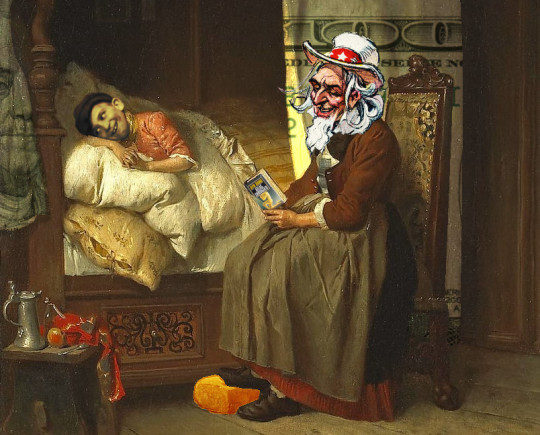#rise and grind
Note
Cult of the Lamb but more messed up

Block chain-based healthcare tech startup of the lamb
6K notes
·
View notes
Text

he's about to scam you or smth
(WATCH OUT THERE'S A SPEEDPAINT BELOW YOU!!!)
3K notes
·
View notes
Text
How America's oligarchs lull us with the be-your-own-boss fairy tale

If you'd like an essay-formatted version of this post to read or share, here's a link to it on pluralistic.net, my surveillance-free, ad-free, tracker-free blog:
https://pluralistic.net/2024/02/16/narrative-capitalism/#sell-job

Capitalism is a vibes-based system. Sure, we all know about Keynes's "Animal Spirits" that see "bulls" and "bears" vying to set the market's future, but beyond that, there's just a hell of a lot of narrative.
Writing for The American Prospect, Adam M Lowenstein reviews two books that tell the histories of the stories that are used to sell American capitalism to the American people – the stories that turn workers into "temporarily embarrassed millionaires":
https://prospect.org/culture/books/2024-02-16-stories-corporations-tell-williams-waterhouse-review/
The first of these books is Taming the Octopus: The Long Battle for the Soul of the Corporation, by Kyle Edward Williams, a kind of pre-history of "woke capitalism":
https://wwnorton.com/books/9780393867237
Taming is a history of the low-water marks for Big Business's reputation in America, and how each was overcome through PR campaigns that declared a turning point in which business leaders would pursue the common good, even at the expense of their shareholders' interests.
The story starts in the 1950s, when DuPont and other massive firms had gained a well-deserved reputation as rapacious profit-generation machines that "alienated workers and pushed around small businessmen, investors, and consumers." This prompted DuPont's PR chief, Harold Brayman, to write a memo called "The Attack on Bigness," where he set out a plan to sell America on a new cuddly image for corporate giants.
For Brayman, the problem was that corporate execs were too shy about telling their social inferiors about all the good that businesses did for them: "The businessman is normally reluctant to talk out loud. He frequently shuns the spotlight and is content with plugging his wares, not himself."
This was the starting gun for a charm offensive by American big business that included IBM president Thomas Watson Jr ("I think there is a world market for about five computers") going on a speaking tour organized by McKinsey & Co, where he told audiences that his company's billion dollar annual profits had convinced it to assume "responsibilities for the broader public welfare."
This set the template for a nationwide mania of "business statesmanship" that Fortune celebrated with an editorial announcing "a great transformation, of which the world as a whole is as yet unaware" that put the "profit motive…on its last leg."
Fortune then spent the next seventy years recycling this announcement, every time the tide went out on business's popularity. In 2019, Fortune platformed IBM president Ginni Rometty for an announcement that the company was orienting its priorities to the public good: "It’s a question of whether society trusts you or not. We need society to accept what it is that we do."
The occasion for Rometty's quote was a special package on the Trump tax-cuts, a trillion-dollar gift to American big business, which lobbyists for the Business Roundtable celebrated with an announcement that American capitalism would now serve "stakeholders" (not just shareholders). Fortune celebrated this "change" as "fundamental and profound."
Fast forward five years and corporate leaders are still telling stories, this time about "stakeholder capitalism" and "ESG" – the dread "woke capitalism" that has right-wing swivel-eyed loons running around, hair afire, declaring the end of capitalism.
For Williams and Lowenstein (and me), all this ESG, DEI, and responsible capitalism is just window dressing, a distraction to keep the pitchforks and torches in people's closets, and to keep the guillotines in their packaging. The right-wing is doing a mirror-world version of liberals who freak out when OpenAI claims to have built a machine that will pauperize every worker – assuming that a PR pitch is the gospel truth, and then repeating it in criticism. Criti-hype, in other words:
https://sts-news.medium.com/youre-doing-it-wrong-notes-on-criticism-and-technology-hype-18b08b4307e5
Think of ESG: the right is freaking out that ESG is harming shareholders by leaving hydrocarbons in the ground to appease climate-addled greenies. The reality is that ESG is barely disguised greenwashing, and it's fully compatible with burning every critter that died in the Mesozoic, Cenozoic, and lo, even the Paleozoic:
https://pluralistic.net/2022/03/15/sanctions-financing/#profiteers
The reason this tactic is so successful is that Americans have also been sold another narrative: that American problems are solved by American individuals as entrepreneurs and businesspeople, not as polities or as members of a union (let alone the working class!).
This is the subject of the second book Lowenstein reviews, One Day I’ll Work for Myself: The Dream and Delusion That Conquered America, by Benjamin Waterhouse:
https://wwnorton.com/books/one-day-ill-work-for-myself/
A keystone of American narrative capitalism is the idea that the USA is a nation of small businesspeople, Jeffersonian yeoman farmsteaders of the US economy. But even a cursory examination shows that the country is ruled – economically and politically – by very large firms.
Uber sells itself as a way to be your own boss ("No shifts. No boss. No limits.") – even though it's a system where the app is your boss, and thanks to that layer of misdirection, Uber gets to be the worst conceivable boss, while its workers have no recourse in labor law:
https://pluralistic.net/2023/04/12/algorithmic-wage-discrimination/#fishers-of-men
In labor fights, Uber represents itself as the champion of innumerable "small businesspeople" who drive its unlicensed taxis. In consumer protection fights, Amazon claims to be fighting for "small businesspeople" who sell on its platform. In privacy fights, Facebook claims to represent "small businesspeople" who buy its surveillance advertising.
But large firms are actively hostile to small firms, seeing them as small-fry to be rooked or destroyed (recall that when Amazon targeted small publishers for bankruptcy-level discounts, they called the program "The Gazelle Project" and Bezos told his executives to tackle these firms "the way a cheetah pursues a sickly gazelle").
Decades of this tale have produced "a profound shift from a shared belief that individuals might come together to solve problems, into a collective faith in individual effort." America's long love-affair with rugged individualism was weaponized in the 1970s by corporations seeking to shed their regulatory obligation to workers, customers, and the environment.
As with Big Tech today, the big business lobby held up mom-and-pop businesses as the true beneficiaries of deregulation, even as they knifed these firms. A telling anecdote comes from someone who worked for the Chamber of Commerce's magazine Nation's Business: when this editor pointed out that many of the magazine's subscribers were small businesspeople and asked if they could start including articles relevant to mom-and-pops, the editor in chief said, "Over my dead body."
The neoliberal era has been an unbroken string of platitudes celebrating the small business and policies that annihilate their chances against large firms. Ronald Reagan's dewy-eyed hymns to American entrepreneurship sounded nice, but what matters is that he attempted to abolish the Small Business Administration and refused to address the 20,000 attendee "White House Conference on Small Business."
In the years since, American has sacrificed its small businesses while pulling out all the stops – bailouts and tax cuts and elite bankruptcy – to keep its largest firms growing. New regulations like Dodd-Frank were neutered in the name of saving mom-and-pop shops, even though the provisions that were cut already exempted small businesses.
Today, millions of Americans are treading water in a fetid stew of LLC-poisoning, rise-and-grind, multi-level-marketing, dropshipping and gig-work, convinced that the only way to get a better life is to pull themselves up by their bootstraps:
https://pluralistic.net/2023/04/10/declaration-of-interdependence/
Narrative does a lot of work here. The American economy runs on bubbles, another form of narrative capitalism. Take AI, a subject I sincerely wish I could stop hearing about, not least because I'm certain that 99% of that thinking is being wasted on whatever residue remains after the bubble pops:
https://locusmag.com/2023/12/commentary-cory-doctorow-what-kind-of-bubble-is-ai/
AI isn't going to do your job, but its narrative may convince your boss to fire you and replace you with a bot that can't do your job. Like what happened when Air Canada hired a chatbot to answer customer inquiries and it started making shit up about bereavement discounts that the company later claimed it didn't have to honor:
https://bc.ctvnews.ca/air-canada-s-chatbot-gave-a-b-c-man-the-wrong-information-now-the-airline-has-to-pay-for-the-mistake-1.6769454
This story's been all over the news for the past couple of days, but so far as I've seen, no one has pointed out the seemingly obvious inference that this chatbot probably ripped off lots of people. The victim here was extraordinarily persistent, chasing a refund for 10 weeks and then going to the regulator. This guy is a six-sigma self-advocate – which implies a whole bell-curve's worth of comparatively normal people who just ate the shit-sandwich Air Canada fed them.
The reason AI is a winning proposition for Air Canada isn't that it can do a customer service rep's job – it can't. But the AI is a layer of indirection – like the app that is the true boss of Uber drivers – that lets Air Canada demoralize the customers it steals from into walking away from their losses.
Nevertheless, the narrative that AI Will Change Everything Forever is powerful – more powerful than AI itself, that's for sure. Take this Bloomberg headline: "Nearly all wealth gained by world's rich this year comes from AI":
https://www.business-standard.com/world-news/nearly-all-wealth-gained-by-world-s-rich-this-year-comes-from-ai-124021600006_1.html
Dig in and you find even more narrative. The single largest beneficiary of AI stock gains last year was Mark Zuckerberg ($161B!). Zuck is American Narrative Capitalism's greatest practitioner: the guy who made billions peddling a series of lies, from "pivot to video" to "metaverse," leaping from one lie to the next just ahead of the mass stock-selloffs that wiped out lesser predators.
The Narrative Capitalism Cinematic Universe has a lot of side-plots like AI and entrepreneurship and woke capitalism, but its main narrative arc was articulated, ad nauseum, by Margaret Thatcher: "There is no alternative." This is the most important part of the story, the part that says it literally can't be otherwise. The only way to organize society is through markets, and the only way to organize markets is to leave them alone, no matter how much suffering they cause.
This is a baffling story, because it's so easily disproved. Zuck says the only way to have friends is to let him surveil you from asshole to appetite, even though he once ran Facebook as the privacy-forward alternative to MySpace, and promised never to spy on you:
https://lawcat.berkeley.edu/record/1128876
Likewise, the business leaders – and their chorus of dutiful Renfields – who insist that monopoly is the natural and inevitable outcome of any market economy just handwave away the decades during which anti-monopoly enforcement actually kept most businesses from getting too big to fail and too big to jail.
I'm no champion of market efficiency – especially not as the best and final arbiter of social and economic questions – but when I hear my comrades repeating the Thatcherite claims that all forms of capitalism necessarily degrade into monopolistic quagmires, that there is no alternative, it sounds like more criti-hype.
This is a frequent point of departure during discussions of enshittification: some people dismiss the whole idea of enshittification as "just capitalism." But we had decades of digital services that either didn't degrade, or, when they did, were replaced by superior competitors with a minimum of switching costs for users who migrated from the decaying incumbent to greener pastures.
The reality is that while there are problems with all forms of capitalism, there are different kinds of capitalist problems, and some forms of capitalism are less harmful to working people and more capable of enacting and enforcing sound policy than others.
Enshittification is what happens when the constraints on the worst impulses of companies and their investors and managers are removed. When a company doesn't have competitors, when it can capture its regulators to trample our rights with impunity, when it can enlist those regulators to shut down would-be competitors who might free us from its "walled garden," and when it can fire any worker who refuses to enact harm upon the users they serve, then that company will enshittify:
https://pluralistic.net/2024/01/30/go-nuts-meine-kerle/#ich-bin-ein-bratapfel
A company can be made to treat you well, even if it is run by a wicked person who sees you as a mark to be fleeced – that mustache twirler just has to be constrained – by competition, regulation, self-help and labor. He may still hate you and wish you harm, but he won't be able to act on it.
As MLK said:
It may be true that the law cannot make a man love me, religion and education will have to do that, but it can restrain him from lynching me. And I think that's pretty important also. And so that while legislation may not change the hearts of men, it does change the habits of men. And we see this every day.
#pluralistic#narrative capitalism#oligarchy#temporarily embarrassed millionaires#late-stage capitalism#enshittification#disenshittification#vocational awe#fobazi ettarh#ai#bubbles#bubblenomics#rise and grind#Benjamin C. Waterhouse#One Day I’ll Work for Myself#Kyle Edward Williams#Taming the Octopus#woke capitalism#llcs with mfas
171 notes
·
View notes
Text

Happy Monday Beautiful Peeps!
#inspiration#be you#blessed#gratitude#all day every day#be your true self#quotes#happy monday#funny but true#rise and shine#rise and grind#hustling#everyday im hustling#monday motivation#monday mood#monday morning#monday morning wake up call
185 notes
·
View notes
Text

rise & vibe 😌💨
#mindymav420#grow healthy#surterra wellness#medical marijuana#kief#roll a joint#girls who smoke weed#mmjcommunity#420love#420life#stoner vibes#joints#sativa#indica#rolling tray#mmjgirls#rise and grind#good morning#cannabis content#weed community#w33d#hippie vibes#flame princess
587 notes
·
View notes
Text





Silly silly guys I like doodling ok uh yea
83 notes
·
View notes
Text
Good morning, getting this Flex Friday started early!💪🏼🌅
149 notes
·
View notes
Text
The cube pushing grindset never stops 💪🦅💯🔥

#cube pushing#cubepusher#cube#cube pushing champion#grindset#rise and grind#oh no the grandma inhaler is back
78 notes
·
View notes
Text
I cant hear coughing the same now, i just coughed and heard "rise and grind time to taste the fucking cash flow". My mind has been altered permanently
24 notes
·
View notes
Text
Everybody is required by god and country to use tumblr as their regular social media. Please post to tumblr every day so that you don’t get in trouble! Here is a photo of today’s daybreak:

Really makes you think.
The cool thing about tumblr is that you can draw pictures or take photographs or type off your thoughts. The world is yours. What are you up to? My current task is rebuilding my drawing practice. I always prefer to draw on paper with simple pencils and pens. However, due to circumstances of my brain’s personality, I have an easier time establishing and keeping habits on computer tools. And so I use the iPad. For some reason, I find it easier and more natural to say to myself “time to draw” and then work on my iPad for a spell. Perhaps because my chosen drafting program, Procreate, has all kinds of tools and all of my drawings in varying stages of completion. If I’m not feeling particularly creative or inspired, I can just doodle for a moment or work on detail hatching, textures, patterns. You’ll notice that patterns are important in my art. Why do I do so many fussy patterns? Because I can relax myself and undertake a soothing, repetitive task. I enjoy that. For example:

Okay my friends,
Remember to always post on tumblr. I love you
-Ayo
34 notes
·
View notes
Text
there's not NEARLY enough lucky domingo content on tumblr. wtf. *rolls up my sleeves*
i have headcanons. i need to deliver.
#first of all. i headcanon she's a nonbinary lesbian#and uses they/she/star pronouns#she's older than trevor by like 2 years#ok ill make a post for my lucky headcanons as a treat if i work hard today#rise and grind#also she has a lesbian boyfriend who uses he/him and is lesbian (i love butches!)#lucky is a lesbian to me. i just feel it in my soul.#ghostbusters#ghostbusting#ghostbusters frozen empire#mangobango#ghostbusters afterlife#lucky domingo#lucky ghostbusters
17 notes
·
View notes
Text
Rise and grind Mr. Freeman…. Rise and… Grind

#wait is this vaguely sexual?#I think it’s coming across that way lol#rise and grind#half life 2#half-life 2#g man#gman#hl#half life#half-life#gordon freeman#Mr freeman#gmanxgordon#gordonman#???#meme#half life memes#half life meme#hlvrai
51 notes
·
View notes
Text
James glance with some of his best work this week

#he really said i'll be true to my name#rise and grind#i have so many thoughts about this episode get ready folks#trent crimm#ted lasso spoilers
85 notes
·
View notes
Text

and here are some motivational words from reigen‼️‼️‼️ RISE AND GRIND 🙏🔥🔥🔥
#i made this like... 5 days ago?#rise and grind#mp100#mob psycho 100#mob psycho#mp100 memes#reigen arataka#arataka reigen#reigen#this is so stupid but i love it#i look at this everyday tbh
342 notes
·
View notes
Text

Silly little drawings of Leslie :333 I like to think Damien and Leslie are cousins (Leslie is adopted cause she's literally a robot) but yea!! ^_^
28 notes
·
View notes
Text

*Chomp*
*Clack*
*Slurp*
#good#morning#good morning#good morning message#good morning image#good morning images#good morning man#the good morning man#the entire morning#gif#good morning messages#monday#monday vibes#happy monday#monday morning#dentist#teeth#drill#drilling teeth#rise and grind#grind
32 notes
·
View notes